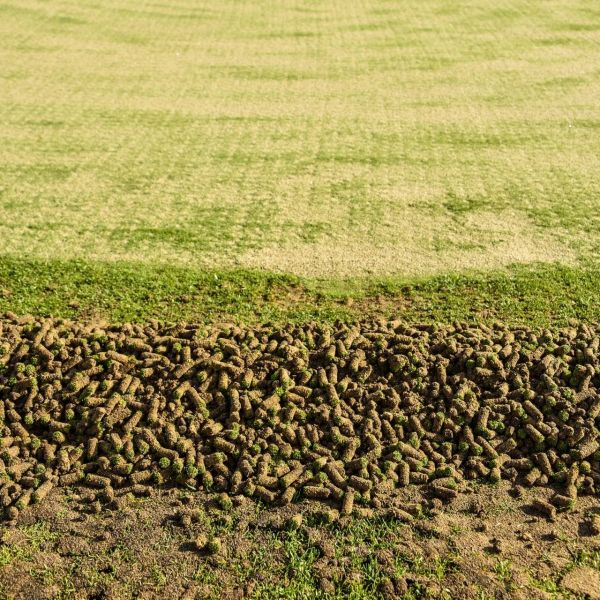Lawn Aeration

A thin, patchy or worn out lawn can be frustrating for any homeowner. You might be embarrassed if your lawn seems to be the worst looking one on the block. If you’ve taken care of your lawn, but it still feels like it’s not doing its best, your soil is possibly compacted and not getting what it needs to thrive. You might find that you need aeration and overseeding to revive it. Through aeration, a machine removes small soil plugs from your lawn, depositing them back into the turfgrass canopy. This process improves water infiltration, oxygen diffusion, and root growth.
Overseeding is a great partner to aeration because you need seed to soil contact to germinate lawn seeds, and you’ve just created the perfect seedbed through aeration. This maximizes your chances of overseeding success so you can thicken up that lawn to prevent weeds and give it that lush, green appearance you envy. Once you complete aeration and overseeding, you want to make sure you do everything to ensure these processes are successful. Here are some tips to guide you.
How to Care For Your Lawn After Aeration and Overseeding?
Aeration and overseeding are some of the most beneficial lawn care services you can give your lawn. But did you know what you do after your service is just as crucial to the process? Proper maintenance is important to ensure successful seed germination to help revitalize your lawn. These key areas can help you boost the process to better your lawn.
Should I Pick Up Soil Plugs After Aerating?
When you first get core aeration services, you might see those tiny soil cores scattered about your lawn and think it looks weird. But these cores are part of the benefits of aerating a lawn. These soil plugs break up and disappear pretty quickly into the grass and soil after a short time of mowing and watering. This adds organic matter back into your soil, enriching it and helping to increase germination after seeding.
How Much Should I Water After Aerating and Overseeding?
Once your lawn care professional is finished aerating and overseeding your lawn, you want to water your lawn, keeping it evenly moist. This can mean different things based on your soil type. If your lawn is heavy clay, it may take longer to saturate than if it’s sandy soil. You want to water approximately one hour per lawn section to apply 0.5 to 1 inches into the soil. The goal is to keep the soil surface moist, whilst not submerging the young seedlings.
You want to continue watering once each day until your lawn seeds germinate, which can take 10 to 14 days. Then you can reduce watering to once a day for 30 minutes in each section until that lawn is established. This gives those tender new shoots a chance to grow strong when reseeding a lawn in the fall.
Can You Walk on Your Lawn After Aeration?
To achieve the maximum benefits of aeration and overseeding, staying off of your lawn as much as possible after the process is a good idea. You want your lawn to be able to repair itself before you use it for recreation again. What does this mean in terms of timing? Keep foot traffic to a minimum for at least one week. If you’ve also overseeded, you should keep traffic off of your lawn for at least one month so the seeds get a chance to grow.
How Long Should I Wait to Fertilize After Overseeding?
Lawns require nutrients to grow strong, healthy roots. Unfortunately, most soils lack adequate nutrition, which is why fertilization can be important. Lawns require air and water, as well as nitrogen, phosphorus, and potassium. Nitrogen boosts new shoot growth, phosphorus builds strong structure in young seedlings, and potassium encourages root growth and hardiness. Nutrients ensure your lawn thrives during regular times, as well as during drought, mowing, or other stressors. Fertilization can be done after seeding, as long as it’s performed correctly and with a slow-release source. You don't want to overfertilize, and you don’t want to use weed control products at this time while new seeds are trying to grow.
How Soon Can You Mow After Aerating and Overseeding?
Mowing weekly during the growing season is important for maintaining a healthy lawn, encouraging thicker growth. So you might be wondering when to mow after overseeding. When grass first germinates, it’s very tender. So it’s important to wait 10 to 14 days until the seed has germinated to mow. Also, don’t collect the clippings. Let them fall to the ground so you recycle nutrients and any leftover seed your mower may have picked up during mowing.
For warm-season grasses, while this timing can vary depending on the grass, it’s usually too late to aerate once the growing season has passed in late summer and into early fall. Southern regions with cooler winters and zoysiagrass or bahiagrass lawns can usually be aerated and overseeded in late spring to early summer. For cool-season grasses, late fall into early winter typically becomes too late to aerate.